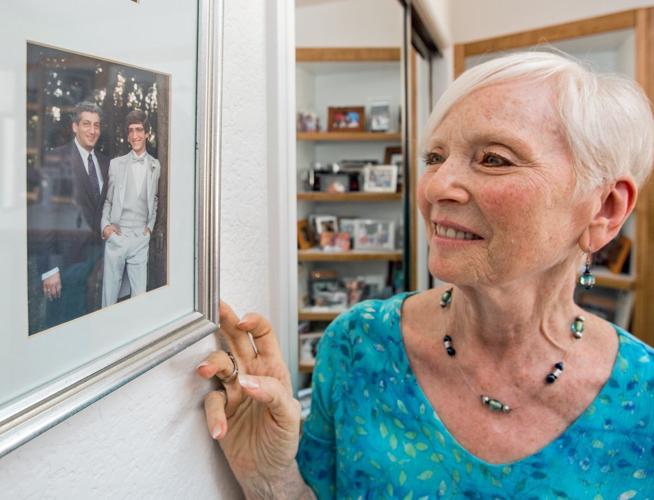Ester Leutenberg is no therapist, but she has about 90 books on mental illness and life management skills to her name.
She does it for Mitchell.
After Leutenberg, 79, lost her son Mitchell Leutenberg to suicide in 1986, she began creating books of handouts for therapists and group facilitators to use with clients.
Her latest book is the first in a new series. “Optimal Well-Being for Senior Adults I” is now available. Other series include “Erasing the Stigma of Mental Health Issues Through Awareness,” “Transitional Life Skills for Teens” and a collection on coping, among others.
On April 28, her alma mater Cleveland Heights High School will honor her in its hall of fame.
“I honestly believe if Mitchell had these handouts, it would have helped him to open up,” Leutenberg says. “A good therapist could have gotten some of that heaviness alleviated by talking about it.”
For eight years prior to the death of their son, Leutenberg and her husband Jay told no one, including his three sisters, about Mitchell’s previous three attempts at suicide. Instead, Leutenberg, living in Cleveland at the time, learned everything she could about her son’s clinical depression.
At the time, nobody spoke about mental illness or suicide, Leutenberg recalls. Their son, 30 at the time of his death, asked them to keep quiet and they agreed, afraid he would move if a mental illness stigma tarnished his reputation as a local businessman.
“He said, ‘Mom I’m going to live as long as I can,’ ” she says. “He always called.”
And the day he didn’t, she knew.
“When he died, we told everyone,” says Leutenberg, who moved to Tucson in 2007.
Mitchell Leutenberg died Nov. 22, 1986. By July 1987, Leutenberg and her daughter Kathy Khalsa, a therapist, were writing their first book: “Life Management Skills I.”
From that grew the company Wellness Reproductions and Publishing Inc., which the family sold in 2001. They were already running a graphic arts business, and Leutenberg found herself without time to create new material.
This has never been about money. Leutenberg writes to make sense of her son’s suffering and to erase any shame attached to mental illness. She wants people to talk about it.
“She believes that opening the topic for people with mental illness and giving them what they need is hugely important,” says Khalsa, an occupational therapist and the interim manager of senior behavioral health at Oro Valley Hospital. “For the most part, they are underserved. It’s not a sexy part of medicine.”
Leutenberg has 89 or 90 completed books — she can’t remember exactly — with others in progress. Of those, only one is a self-help book. The rest are workbooks with reproducible handouts therapists can use with their clients.
For each book, Leutenberg works with a professional in the mental health industry to shape the handouts. Then she sends a manuscript to experts for feedback.
Khalsa believes she and her mother were some of the first to produce this kind of material.
“Now it seems basic to go on the Internet to pull something down, but this was before that,” says Khalsa, who has co-written more than a dozen books with her mother. “Individual clinicians were using the same handouts over and over again.”
Many therapists researched and produced their own material. That was the origin of the first book, Khalsa says — she wanted something unique to better help her own clients.
“As a facilitator, you can’t be dreaming up activities and making handouts,” says Carol Butler, who spent her career in California as a psychiatric nurse. “It’s all you can do to get to work and take care of clients.”
Butler has written more than a dozen books with Leutenberg.
Leutenberg works with Whole Person Associates and others to publish her work. Her audiences include veterans, families and teenagers. Whether writing about grief or stress, so much of it comes back to life skills.
“Her real intention, from the very first book to her very last book, has been to impact the lives of individuals who need help, whatever it is,” says Sandra Negley, University of Utah program director for recreational therapy. She has also written several books with Leutenberg.
Khalsa suspects her mother will write until she can’t anymore.
“She advocates for people with mental illness in everything she does,” Khalsa adds, referring to Leutenberg’s involvement leading support groups, her membership on the board of Survivors of Suicide Tucson and her support of the Coyote Task Force, a rehabilitation program for individuals with a mental illness.
“I am very open about Mitchell,” Leutenberg says. “I tell people. I put it out there. And people who ordinarily would not be able to talk are able to talk to me about it … On April 9, he would have been 60.”





